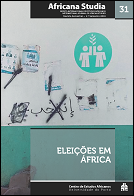Elections in Africa and China’s Position: African Opinion
Resumo
Almost half of African conflicts are “post-electoral”, aroused by disputed claims over legitimacy of the elections, including leaders staying in power past a designated two-term limit. Substantial proportions of the population in Africa are skeptical about the quality of their elections. They talk about vote manipulation, lack of transparency of election monitoring bodies and corruption. Poor electoral
process produces public mistrust, protest, and violence. The most serious problem is interference of external forces into election process. The US brings
which is essential to growth and stability, while the West model places a premium on human rights and democracy. Most Africans believe that food, shelter and health are more important than the right to vote. So they make a choice for the Beijing Model instead of the Washington Consensus. But Zambia
has become one of the first African countries where China’s role turned into potent political issue. Michael Sata anti-Chinese sentiment helped him to defeat President Rupiah Banda on the elections of 2011. Оn the eve of Zambia’s presidential elections one of the most common tropes about the vote was to describe it as a referendum on China.
Downloads
Downloads
Publicado
Como Citar
Edição
Secção
Licença
Os autores cedem à Revista Africana Studia o direito exclusivo de publicação dos seus textos, sob qualquer meio, incluindo a sua reprodução e venda em suporte papel ou digital, bem como a sua disponibilização em regime de livre acesso em bases de dados.
As imagens, no caso de serem originais e enviadas por via postal, serão devolvidas se assim for explicitado pelos autores.
A Africana Studia é uma revista de acesso aberto que visa promover a divulgação e o debate da investigação científica. Todos os artigos aceitos são, portanto, publicados gratuitamente para autores e editores.




